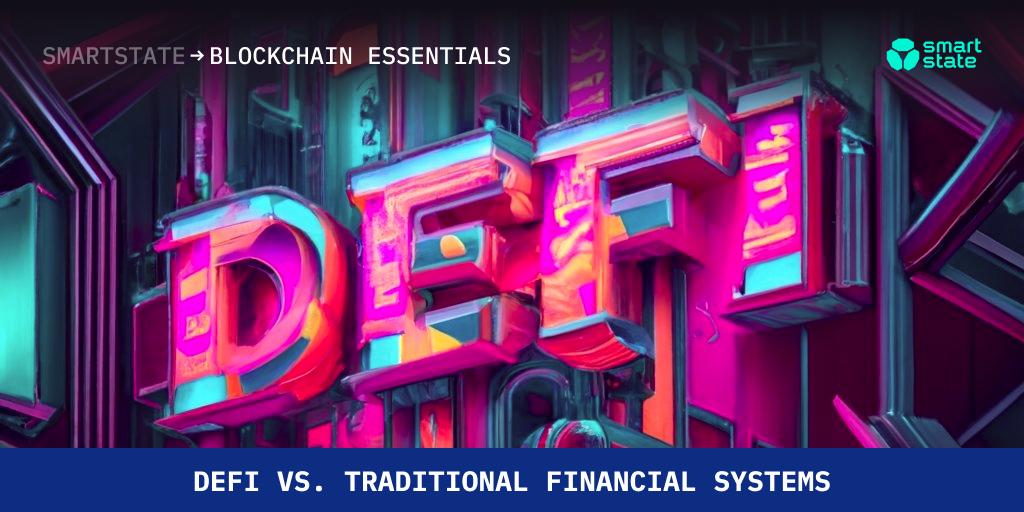Decentralized finance (DeFi) vs. traditional financial systems
Decentralized finance (or DeFi) has become popular and the popularity is rapidly growing on showing high potential as a convenient platform for transactions and financial services. Being built on blockchain, it opens broad horizons for creating and exchanging assets without intermediaries, and provides more transparency and security. There is one specific benefit, that it provides individuals who have difficulties with access or use of traditional banking systems (developing countries’ citizens, users without credit history, etc.). DeFi helps people to embrace greater financial autonomy, hold control over their assets on their own and make transactions faster and with more security. Smart contracts are self-executed and run automatically, without external control. All this makes the system more efficient and cost-effective in comparison to traditional systems.
DeFi benefits
There are various benefits which principles of decentralized finance can offer users to take security and transparency to another level and support economic growth, disrupting traditional systems’ principles.
- Directness. Traditional financial systems usually maintain scores of intermediaries (banking institutions, brokers, etc.), which slows the working process down and makes it less secure. DeFi offers direct asset and money management completely bypassing the need of this chain
- Better accessibility. Clients often struggle with various problems in traditional financial affairs, facing barriers and bureaucracy. Decentralized financial systems need only a good Internet connection. Access to DeFi systems is permissionless, disregarding users’ location and often without funds limitation.
- Transparency. Traditional systems are closed communities and institutions, so clients can not easily track the way their money goes. A DeFi system users can follow their money anytime and see what exactly happens to it at any moment. On a public blockchain every transaction is shown and verified by other users. The protocols are built with open source code and any user can view it.
- Security. Unlike traditional systems based on human factor and authorities’ control, a decentralized finance system is based on self-executing smart contracts enforcing agreement rules and regulations. It helps to avoid common errors related to the human factor, and even fraud and other criminal activities. In addition, tamper-proof data coordination takes security to a higher level. The participants of decentralized financial market space keep custody and control over their assets, funds and personal data.
- Flexibility. DeFi protocols are sometimes called ‘money legos’ for their ability to change and integrate. Smart contracts can also help users to create financial products and services on their own and customize their financial tools according to their goals and requirements. DeFi protocols and apps are created with an ability to integrate and complement each other. It allows developers to add adjustments to existing protocols, customize interfaces and build in and adopt third-party apps.
- Cost-efficiency. Due to bureaucracy and numerous fees and commissions, traditional systems are quite expensive, while a decentralized finance system is more cost-efficient, as it helps to avoid the majority of those payments.
- Innovation. The field of DeFi is still fast growing and changing, lots of new advanced financial products and services are invented there, providing users with brand new tools which do not exist in the traditional financial sphere. Smart contracts are highly programmable and help to create new assets and financial tools.
Popular services and use cases
There are various useful DeFi services which make users’ lives better and work more comfortable and convenient. DeFi offers P2P lending, when users can borrow assets and money directly from one another without intermediaries or commissions, with the help of smart contracts. It is possible to sell various digital assets on DEXes (decentralized exchanges), which use automated market makers and liquidity pools, and manage them easily with the help of special protocols. Also insurance is provided against common risks (such as smart contract failures, hacks, errors).
Apart from asset and wallets management, which is one of the key cases, Decentralized Finance addresses numerous use cases as well. Here are some examples.
- Compliance. In the field of traditional finance all compliance (anti-money laundering, counterfeiting the financing of terrorism, other cases) is related to KYC guidelines and requires information about the participants. DeFi infrastructure offers a special compliance analysis of the addresses’ behavior and does not always need to analyze the participant’s identity, which maintains privacy and helps to manage risks in real time.
- Addressing data. DeFi protocols provide users with advantages in data analysis and decision making in finance and risk management. There are a great number of useful tools and dashboards, which help to track value, assess risks, compare liquidity and so on.
- DAO and DEX. There are some DeFi protocols, which are used for fundraising, managing financial operations and decentralizing governance to communities for DAOs. DeFi space also includes DEXes popular among users. DeFi liquidity data aggregators help to combine and improve the trading experience, offering their users parallel insight, helping to find the best price offers with optimal gas and low failure rates.
- Tokenization and stablecoins. Tokenization of one of the key points of decentralized finance, opening a large variety of advantages and economic possibilities. Tokens are secure by design, easily transferrable and programmable to fit almost all types of property, replacing bulky and ambiguous traditional kinds of proof of ownership, and offer users a digital alternative way to access, trade and store value. Stablecoins are another useful means of payment, now implemented in the space of Decentralized Finance for lending, borrowing and paying.
- Identity. DeFi protocols are combined with blockchain-based identity systems providing users with access to the global economy. They offer opportunities to users with no extra funds, help to assess creditworthiness, analyze reputation and financial activity instead of traditional attributes, which often cross out possible participants with no real estate property or income proving documentation. On the other hand, DeFi infrastructure respects sensitive data privacy and lets the participants control their personal information and assets.

